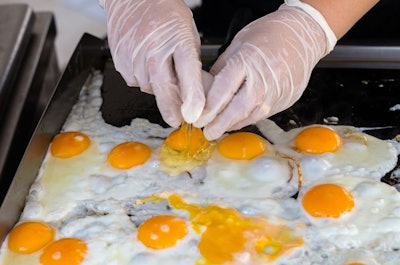
Of all the companies vowing to only source cage-free eggs, those in the North American foodservice industry were among the most ambitious.
While all of the major grocery retailers in the United States and many of the largest restaurant chains in the U.S. and Canada have vowed to transition their egg supply to 100% cage-free eggs, most of those companies in the retail and restaurant industries have yet to complete their transitions. For many of those, target years of completion are 2022, 2025 and 2026.
It is a different scenario for those in the foodservice sector.
According to a commitment tracker webpage, brought to WATT Global Media’s attention by the Humane Society of the United States (HSUS), about half of those foodservice providers committed to complete the transition before 2020. If those commitments were filled, the following foodservice companies are now exclusively serving cage-free eggs: Epicurean Group, Parkhurst Dining, Guest Services Inc., Delaware North Companies, Legends Hospitality Management, Food For Thought, LMP Epicurean Feast, RMA Hospitality Management, Taher Inc., Café Services Inc., Compass Group North America, CulinArt Group and Creative Dining Services.
Meanwhile, the following companies pledged to serve only cage-free eggs on or before 2020: Sodexo, Aramark, Unidine Corp., Centerplate, Whitsons Culinary Group, Opaa Food Management, Spectra Food Services & Hospitality, Southern Foodservice, Lancer Hospitality, Quest Food Management Services and AVI Foodsystems.
An infographic listing the foodservice companies to make cage-free egg pledges, and the dates the transitions were to be completed is shown below.

One of the groups to lead the campaign for exclusively sourcing cage-free eggs has been HSUS, which also advocated for companies to transition their broiler chicken meat supply to meet Global Animal Partnership (GAP) standards. HSUS and other animal rights group claim both cage-free egg production and GAP-certified chicken is better from an animal welfare perspective than conventional production.
Josh Balk, Josh Balk, vice president, farm animal protection, HSUS, said the foodservice industry’s early adoption of GAP standards is evidence of it “collectively being on the forefront of issues of animal welfare.”

















